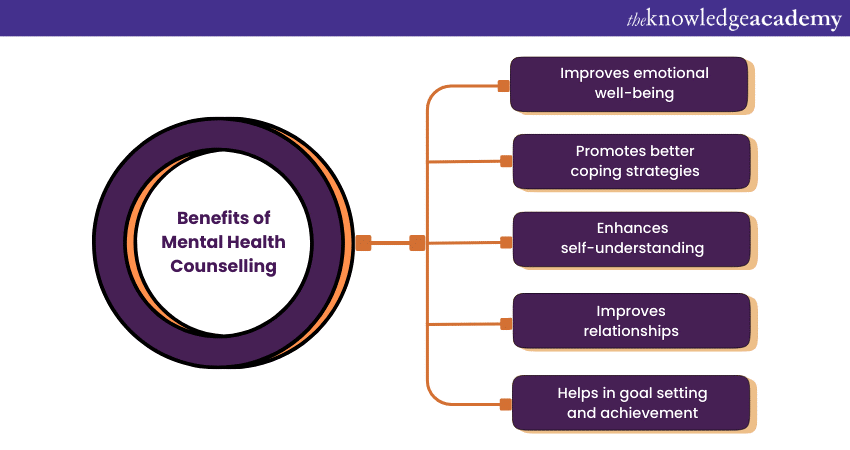The Single Strategy To Use For Mental Health Counseling
The Single Strategy To Use For Mental Health Counseling
Blog Article
6 Easy Facts About Mental Health Counseling Explained
Table of ContentsEverything about Mental Health CounselingGet This Report on Mental Health CounselingGet This Report on Mental Health CounselingThe Single Strategy To Use For Mental Health CounselingThe Main Principles Of Mental Health Counseling
With treatment, you can obtain understanding into your very own patterns of habits and interaction, which can cause more fulfilling and pleasing connections with close friends, household, and romantic companions. What we think, we show up. If you're consumed with unfavorable emotions and adverse ideas that are hindering your life, therapy can help., or there are other adverse means you act. Treatment can aid you modify those behaviors that are having an unfavorable impact on your world and relationships.

Obtaining therapy to resolve particular elements of your life can aid you be much more productive in various other locations, including job.

How Mental Health Counseling can Save You Time, Stress, and Money.
There are even more benefits of therapy than just the ones we have actually reviewed., or develop connections (charming or those with family or close friends) in a healthy and balanced means.
For the objective of the here and now study, viewed benefits and barriers to psychological health help-seeking are being discovered. Previous study discovered that viewed obstacles have a substantial effect on university trainees' wellness habits options (Von Ah, Ebert, Ngamvitroj, Park & Kang, 2003). Perceived benefits and obstacles to help-seeking were especially chosen due to their influence on decision-making and inevitably action (Glanz, Rimer, & Su, 2005).
The present research study looks for to take a look at whether or not preconception offers as an obstacle to therapy amongst university trainees. Among these were: (1) favoring to deal with mental health issues themselves, (2) not having enough time to get involved in therapy, (3) questions about whether psychological wellness treatment is effective in remediating troubles, (4) a belief that anxiety is regular or the issue will obtain much better without treatment, (5) absence of cash, and (6) worry about what others would certainly believe if they found out about treatment engagement.
Staff in university psychological wellness facilities may be perceived as hostile, and long wait times for services might be "off-putting" for trainees. Variables promoting much more favorable perspectives are typically at the opposite post of those elements identified as barriers.
Rumored Buzz on Mental Health Counseling
One in 3 (34.6%) reported residing on university and one in four (23.3%) reported living with moms and dads. Almost half of pupils were associated with school organizations and 1 in 10 reported being in a fraternity or sorority. More than one-third of trainees (38.1%) reported that they had a household participant or close friend with a detected mental wellness disorder.

A Biased View of Mental Health Counseling
Univariate F-tests recognized certain subscale things that dramatically varied. Women were informative post much less likely than males to perceive people that most likely to counseling as mentally weak, people who go to counseling as crazy, to feel that individuals with mental health issues should manage troubles by themselves, that More Help people who most likely to therapy as unable to solve issues, that individuals that most likely to therapy slouch, and to really feel that people that most likely to therapy are various from normal people in a negative way.
Study results revealed that females were significantly much less likely than males to hold stigma-related attitudes. This follows previous research study which additionally discovered that males hold greater degrees of perceived preconception than women (Chandra & Minkovitz, 2006). Based on study findings, it is noticeable that men may be less likely than females to look for therapy due to low regarded obstacles in addition to high stigma-related mindsets.
The Only Guide for Mental Health Counseling
On top of that, college health specialists might offer educational programs targeting males with details on the benefits of mental health and wellness therapy and the relevance of looking for assistance when required. All methods must be examined with future study to identify the result on university student, particularly men. Unlike basic population studies which reveal that females are more probable to look for out mental health and wellness services compared to males (Haunstein et al., 2006; Mackenzie, Gekoski, & Knox, 2006), today research located no considerable differences in the number of perceived obstacles to help-seeking actions based upon sex.
Researchers speculate that this is primarily because of traditional social standards and sex functions that defined men based on strength and lack of emotional expression (Addis & Mahalik, 2003; Ang, Lim, Tan, & Yau, 2004; Mojtabai, 2007). Generally, there have been blended results amongst the university student population regarding sex distinctions (Rosenthal & Wilson, 2008). This searching for was unforeseen and can highlight that those who had received therapy had a better important site concept of delay times and other "access" obstacles that might make it challenging to start therapy. Possibly, individuals that have actually received therapy sight more obstacles than participants who have not gotten therapy given that seeking therapy services once again might entail worry of self-disclosing individual info to a brand-new counselor.
Report this page